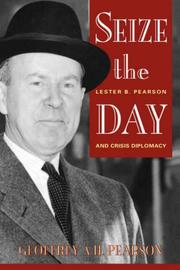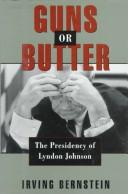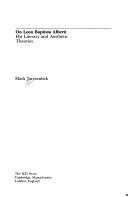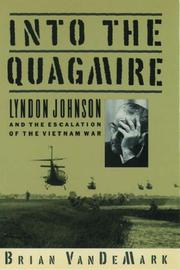| Listing 1 - 10 of 32 | << page >> |
Sort by
|

ISBN: 0773573844 9780773573840 0886292166 9780886292164 0886292174 9780886292171 Year: 1993 Publisher: Ottawa : Carleton University Press,
Abstract | Keywords | Export | Availability | Bookmark
 Loading...
Loading...Choose an application
- Reference Manager
- EndNote
- RefWorks (Direct export to RefWorks)
Prime ministers --- Pearson, Lester B., --- Pearson, L. B. --- Pearson, Lester Bowles, --- Canada --- Foreign relations. --- Pearson, Lester B.
Book
ISBN: 9088905010 9789088905018 9789088905001 9088905002 9789088904998 9088904995 Year: 2017 Publisher: Leiden, [Netherlands] : Sidestone Press,
Abstract | Keywords | Export | Availability | Bookmark
 Loading...
Loading...Choose an application
- Reference Manager
- EndNote
- RefWorks (Direct export to RefWorks)
Starting in the year 1828, Lucien Bonaparte, Prince of Canino, unearthed more than 2000 Greek vases on his estate near the ancient Etruscan town of Vulci. The vases were restored and found their way to archaeological collections all around the world. This volume publishes 10 papers by scholars of international repute dealing with these ceramics. The papers were presented in 2015 at a colloquium in the National Museum of Antiquities in Leiden, which acquired 96 vases from the Bonaparte collection in 1839. Specialists in the fields of museum history, Greek vase-painting, restoration and 19th century collecting practices from the Netherlands, France, Germany, Denmark, Austria, Italy and Russia have contributed to this volume, which offers the newest insights into the person of Lucien Bonaparte, his excavation practices, the history of restorations and the selling and buying of Greek ceramics in the 19th century. The results have helped to extend our knowledge of the collectors, traders and scholars, who were concerned with Greek vases during the 19th century. Their activities took place in a pivotal period, in which the black- and red figure ceramics, which had come to light in Italy during the previous centuries, were finally assigned to Greek craftsmanship instead of to Etruscan manufacture--
Bonaparte, Lucien, --- B., L., --- Bonaparte, Luciano, --- Buonaparte, Lucien, --- Canino, Lucien Bonaparte, --- L. B., --- Vases, Greek --- Conservation and restoration --- History --- Collectors and collecting --- Rijksmuseum van Oudheden te Leiden

ISBN: 0195063120 9786613121370 019987431X 1283121379 9780199874316 9780195063127 9781283121378 6613121371 Year: 1996 Publisher: New York : Oxford University Press,
Abstract | Keywords | Export | Availability | Bookmark
 Loading...
Loading...Choose an application
- Reference Manager
- EndNote
- RefWorks (Direct export to RefWorks)
The presidency of Lyndon Johnson was a pivotal moment in twentieth-century American history. From the decisive social programs of the Great Society, to the triumph of the Civil and Voting Rights Acts, to the catastrophe of the Vietnam War and domestic unrest, it was an era of dramatic accomplishment and wrenching tragedy. In Guns or Butter, renowned historian Irving Bernstein brings those five climactic years of the sixties vividly to life, from the moment Lee Harvey Oswald aimed a rifle from the window of the Texas School Depository to the tense ballot-counting that put Richard Nixon in the W
United States --- Politics and government --- 1963-1969 --- Presidents --- Biography --- Johnson, Lyndon B. --- Chan-sên, --- Johnson, Lyndon Baines, --- Dzhonson, Lindon, --- L. B. J. --- ג'ונסון, לינדון --- ジョンソン, --- Johnson, L. --- Čhō̜nsan, Lindō̜n Bī.,
Book
ISBN: 1625344074 1613766564 9781613766576 1613766572 9781613766569 9781625344083 9781613766552 1613766556 9781625344069 9781625344076 1625344082 Year: 2019 Publisher: Amherst ; Boston : University of Massachusetts Press,
Abstract | Keywords | Export | Availability | Bookmark
 Loading...
Loading...Choose an application
- Reference Manager
- EndNote
- RefWorks (Direct export to RefWorks)
New York Times Company --- New York Times (Firm) --- Sullivan, L. B. --- Trials, litigation, etc. --- Libel and slander --- Freedom of the press --- Calumny --- Defamation --- Slander --- Torts --- History. --- Law and legislation
Book
ISBN: 9781626186934 1626186936 9781626186248 1626186243 Year: 2013 Publisher: New York : Nova Publishers,
Abstract | Keywords | Export | Availability | Bookmark
 Loading...
Loading...Choose an application
- Reference Manager
- EndNote
- RefWorks (Direct export to RefWorks)
Presidents --- Johnson, Lyndon B. --- Chan-sên, --- Johnson, Lyndon Baines, --- Dzhonson, Lindon, --- L. B. J. --- ג'ונסון, לינדון --- ジョンソン, --- Johnson, L. --- Čhō̜nsan, Lindō̜n Bī., --- United States --- Politics and government
Book
ISBN: 9780300182422 0300182422 9780300180503 0300180500 Year: 2015 Publisher: New Haven, CT : Yale University Press,
Abstract | Keywords | Export | Availability | Bookmark
 Loading...
Loading...Choose an application
- Reference Manager
- EndNote
- RefWorks (Direct export to RefWorks)
A firsthand observer weighs the achievements-and failures-of two fabled American presidents As a young White House correspondent during the Kennedy and Johnson years in Washington, D.C., Godfrey Hodgson had a ringside seat covering the last two great presidents of the United States, John F. Kennedy and Lyndon B. Johnson, two men who could not have been more different. Kennedy's wit and dashing style, his renown as a national war hero, and his Ivy League Boston Brahmin background stood in sharp contrast to Lyndon Johnson's rural, humble origins in Texas, his blunt, forceful (but effective) political style, his lackluster career in the navy, and his grassroots populist instincts. Hodgson, a sharp-eyed witness throughout the tenure of these two great men, now offers us a new perspective enriched by his reflections since that time a half-century ago. He offers us a fresh, dispassionate contrast of these two great men by stripping away the myths to assess their achievements, ultimately asking whether Johnson has been misjudged. He suggests that LBJ be given his due by history, arguing that he was as great a president as, perhaps even greater than, JFK. The seed that grew into this book was the author's early perception that JFK's performance in office was largely overrated while LBJ's was consistently underrated. Hodgson asks key questions: If Kennedy had lived, would he have matched Johnson's ambitious Great Society achievements? Would he have avoided Johnson's disastrous commitment in Vietnam? Would Nixon have been elected his successor, and if not, how would American politics and parties look today? Hodgson combines lively anecdotes with sober analyses to arrive at new conclusions about the U.S. presidency and two of the most charismatic figures ever to govern from the Oval Office.
Presidents --- Kennedy, John F. --- Johnson, Lyndon B. --- Chan-sên, --- Johnson, Lyndon Baines, --- Dzhonson, Lindon, --- L. B. J. --- ג'ונסון, לינדון --- ジョンソン, --- Johnson, L. --- Čhō̜nsan, Lindō̜n Bī., --- Kennedy, John Fitzgerald --- United States --- Politics and government
Book
ISBN: 1108140572 1108140378 110814120X 1107193036 1316643476 9781108141208 9781108140379 9781107193031 9781316643471 Year: 2018 Publisher: Cambridge : Cambridge University Press,
Abstract | Keywords | Export | Availability | Bookmark
 Loading...
Loading...Choose an application
- Reference Manager
- EndNote
- RefWorks (Direct export to RefWorks)
1968 was an unprecedented year in terms of upheaval on numerous scales: political, military, economic, social, cultural. In the United States, perhaps no one was more undone by the events of 1968 than President Lyndon Baines Johnson. Kyle Longley leads his readers on a behind-the-scenes tour of what Johnson characterized as the 'year of a continuous nightmare'. Longley explores how LBJ perceived the most significant events of 1968, including the Vietnam War, the assassinations of Martin Luther King, Jr and Robert Kennedy, and the violent Democratic National Convention in Chicago. His responses to the crises were sometimes effective but often tragic, and LBJ's refusal to seek re-election underscores his recognition of the challenges facing the country in 1968. As much a biography of a single year as it is of LBJ, LBJ's 1968 vividly captures the tumult that dominated the headlines on a local and global level.
Presidents --- Election --- Johnson, Lyndon B. --- Chan-sên, --- Johnson, Lyndon Baines, --- Dzhonson, Lindon, --- L. B. J. --- ג'ונסון, לינדון --- ジョンソン, --- Johnson, L. --- Čhō̜nsan, Lindō̜n Bī., --- United States --- Politics and government

ISBN: 0262100428 0262367890 9780262367899 9780262100427 Year: 1989 Publisher: Cambridge (Mass.): MIT Press,
Abstract | Keywords | Export | Availability | Bookmark
 Loading...
Loading...Choose an application
- Reference Manager
- EndNote
- RefWorks (Direct export to RefWorks)
A penetrating study of Alberti's writings on philosophy, ethics, aesthetics architecture, and literature.Listen to Alberti's voice. This is what Mark Jarzombek has done in studying virtually all of Alberti's writings on philosophy, ethics, aesthetics architecture, and literature. Jarzombek's thorough grasp of Alberti's thought and painstaking analysis of his elusive identity transform our image of this remarkable man carving out a new place for Alberti in literary theory, art history, and Renaissance scholarship.Instead of warming over the stereotypes of Alberti as a ""universal man"" or as a proponent of ""civic Humanism,"" Jarzombek explores Alberti's views on the relationship between the writer and society. He asserts that, while Alberti was indeed an architect, an art theorist and a man of letters, he was above all a theoretician of writing: ""Everywhere one turns, the problems of writing, authorship and textuality seem to appear, from his first writings... to his last."" Jarzombek, opening the possibilities for a different type of discussion of Alberti and of such major works as De pictura and De re aedificatora, places Alberti more accurately within the context of his times and clarifies the intertextual relationship among his works. Jarzombek's investigation brings to light themes that have remained hidden in the complex world of Alberti's speculations. The Alberti of Jarzombeks book is an outsider struggling to resolve conflicting impulses of pessimism and hope. He is also a profound and willful thinker who, while amalgamating contemporary trends, did not endorse them but countered with a cosmological philosophy of his own.
Alberti, Leon Battista, --- Philosophy --- Alberti, Leon Battista --- -Philosophy --- Criticism and interpretation --- Criticism and interpretation. --- Albert, Leon Baptiste --- Alberti, Leon Batista --- Philosophy. --- Alberti, Leo Baptista, --- Alberti, Leon Batista, --- Alberti, Leonis Baptiste, --- Alberti, Leone Battista, --- Alberti, L. B. --- Alberti, Battista, --- אלברטי, ליאון באטיסטה --- Lepidus, --- Aesthetics. --- Alberti, Leon Battista, - 1404-1472 - Philosophy --- ARCHITECTURE/Architectural History/General --- Alberti, Leon Battista, - 1404-1472
Book
ISBN: 0826218199 0826266479 9780826266477 9780826218193 Year: 2008 Publisher: Columbia : University of Missouri Press,
Abstract | Keywords | Export | Availability | Bookmark
 Loading...
Loading...Choose an application
- Reference Manager
- EndNote
- RefWorks (Direct export to RefWorks)
"Uses recently declassified sources to trace the successes and limitations of the Johnson administration's efforts to use food aid as a diplomatic tool during the Cold War, both to gain support for U.S. policies and to reward or punish allies such as Israel, India, and South Vietnam"--Provided by publisher.
Food relief, American --- Food supply --- Political aspects. --- Political aspects --- Johnson, Lyndon B. --- United States --- Developing countries --- Foreign relations --- Food control --- American food relief --- Johnson, Lyndon Baines, --- Chan-sên, --- Dzhonson, Lindon, --- L. B. J. --- ג'ונסון, לינדון --- ジョンソン, --- Johnson, L. --- Čhō̜nsan, Lindō̜n Bī., --- Produce trade --- Agriculture --- Food security --- Single cell proteins

ISBN: 0195096509 9780195096507 1423740572 9781423740575 1280451203 9781280451201 0195357191 9780195357196 0198022980 1602560412 0199880042 Year: 1995 Publisher: New York ; Oxford : Oxford University Press,
Abstract | Keywords | Export | Availability | Bookmark
 Loading...
Loading...Choose an application
- Reference Manager
- EndNote
- RefWorks (Direct export to RefWorks)
In November of 1964, as Lyndon Johnson celebrated his landslide victory over Barry Goldwater, the government of South Vietnam lay in a shambles. Ambassador Maxwell Taylor described it as a country beset by ""chronic factionalism, civilian-military suspicion and distrust, absence of national spirit and motivation, lack of cohesion in the social structure, lack of experience in the conduct of government."" Virtually no one in the Johnson Administration believed that Saigon could defeat the communist insurgency--and yet by July of 1965, a mere nine months later, they would lock the United States
Vietnam War, 1961-1975 --- United States --- Politics and government --- 1963-1969 --- Vietnam Conflict, 1961-1975 --- Vietnamese Conflict, 1961-1975 --- Vietnamese War, 1961-1975 --- Causes. --- Johnson, Lyndon B. --- Chan-sên, --- Johnson, Lyndon Baines, --- Dzhonson, Lindon, --- L. B. J. --- ג'ונסון, לינדון --- ジョンソン, --- Johnson, L. --- Čhō̜nsan, Lindō̜n Bī.,
| Listing 1 - 10 of 32 | << page >> |
Sort by
|

 Search
Search Feedback
Feedback About UniCat
About UniCat  Help
Help News
News